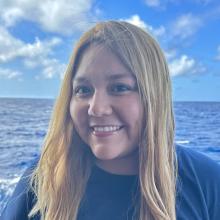
Rosie Chapina
Tell us about your work/ research. What kinds of things do you do?
My research is centered on understanding the impacts of climate change on zooplankton behavior, with a specific focus on mysid shrimp in lake ecosystems. While my primary focus has been on the Great Lakes, I have also conducted studies in various European lakes. My work aims to deepen our understanding of mysid shrimp migration patterns and predator-prey interactions. Through a combination of field observations and controlled experiments, I investigate the predation risk faced by mysid shrimp in the presence of fish predators. Freshwater mysids exhibit diel vertical migration, remaining at the lake bottom during the day and ascending to the water column at night. Learning why they exhibit that migration is a key question in my work.
What sparked your initial interest in your career?
I have always been passionate about learning about food webs and have a deep love for aquatic environments. My fascination with water ecosystems began in the 3rd grade during a field trip to the San Francisco Bay. I vividly remember a graduate student collecting a water sample and using a Ponar grab to collect benthic organisms. I was captivated by the incredible diversity of small, yet uniquely fascinating critters. Since then, I have worked with zooplankton in marine, estuarine, and freshwater systems. My love for marine research, in particular, has driven me to explore how these different ecosystems are interconnected. One of my main passions is understanding the intricate ways in which these diverse aquatic environments and their inhabitants are intertwined.
Who influenced you or encouraged you the most?
I am very grateful to the many teachers and professors who have inspired and supported me in pursuing a career in aquatic biology. Many of my educators took us on excursions to parks, aquariums, and short cruises, continually fostering our connection to nature. Their encouragement and dedication played a significant role in shaping my passion for this field.
What element of your work/ study do you think is the most fascinating?
There have been many things that have fascinated me throughout my career. However, one thing I really enjoy is deploying benthic cameras (200 m) that records mysid shrimp in the benthic habitat, and conducting mid-water trawling. I feel a rush of excitement every time we retrieve the equipment and get to see the variety of fish we've captured.
How did you get involved with Ocean Exploration Trust? How did you become part of the expedition team?
As a Knauss Fellow, I am currently engaged in a role with NOAA's ocean exploration program. One aspect of my portfolio involves optimizing the utilization of samples collected from the Okeanos Explorer and the Nautilus expeditions.
What other jobs led you to your current career?
One of the most transformative experiences that shaped my decision to pursue a career in aquatic biology was an REU/internship I undertook in Solomons Island, situated in the Chesapeake Bay region. During this program, I had the opportunity to contribute to various projects, primarily focused on fisheries research. Additionally, I gained valuable experience working in a genetics laboratory that specialized in studying rotifer community composition.
What are your degrees and certifications?
Bachelor of Science in Forensic Science (Biology concentration)
PhD in Natural Resources (defenfing August 2024)
What are your hobbies?
I love playing tennis, singing/dancing, swimming ( anything with water), traveling and exploring new cities.
What advice would you give someone who wants to have a career like yours?
I would advise those interested in aquatic biology to actively seek hands-on experience, going beyond the confines of the classroom. While a strong foundational knowledge is crucial, it's the practical application of that knowledge that truly matters. I always encourage students to expand their horizons by networking and pursuing opportunities that challenge them beyond their comfort zones. Embracing discomfort can lead to growth and new discoveries in this field.
What excites me the most is the prospect of unveiling hidden ecosystems and discovering new marine life forms. I am eager to delve into the mysteries of the deep ocean, ready to embrace the unexpected and expand our understanding of this fascinating realm.
Expeditions
Rosie participated in the following Ocean Exploration Trust expeditions:
